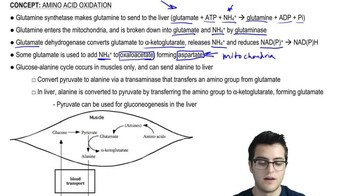Fill in the blanks: A/an ________ is a nutrient that the body requires in large quantities, whereas a/an ________ is one that the body requires in much smaller quantities. A/an ________ is a nutrient that the body cannot produce and so must be supplied from the diet.
Certain diet plans claim that a person may eat all the protein he or she wants, as protein is not stored by the body. Is this claim completely accurate? Explain.
 Verified step by step guidance
Verified step by step guidance
Verified Solution
Key Concepts
Protein Metabolism

Amino Acid Balance

Caloric Surplus
Which of the following statements is false?
a. Fiber is a polysaccharide that is completely or partially indigestible by the human body.
b. A complete protein contains all the essential amino acids.
c. Saturated fats contain hydrogen atoms arranged on opposite sides of the carbon-carbon double bond.
d. Linoleic and linolenic acid are essential fatty acids.
Your friend hears about the latest fad diet that consists entirely of fat. Predict the initial effects such a diet might have on your friend's concentration, memory, and other nervous system functions. Would you recommend this diet to anyone? Why or why not?
How do fat-soluble and water-soluble vitamins differ? Which vitamins are fat-soluble?
Mark the following statements as true or false. If a statement is false, correct it to make a true statement.
a. Vitamins and minerals are used as fuel sources for cells.
